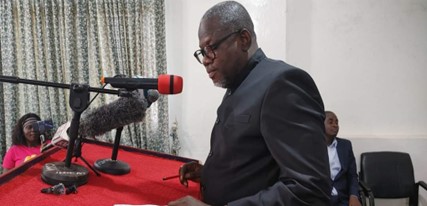The Liberia Anti-Corruption Commission (LACC) has found itself under fire following its announcement regarding an investigation into alleged bribery linked to the Liberia Water and Sewer Corporation (LWSC) and the Ministry of Transport. The criticism, particularly from the Minister of Information, Cultural Affairs, and Tourism, Jerolinmek Matthew Piah, revolves around the perception that the LACC’s declaration may have been premature. Piah articulated concerns about how the LACC’s public disclosures could potentially tarnish the reputations of various individuals implicated in the investigation before any robust examination of the facts. This situation ignited debates on the need for meticulous and professional handling of sensitive national inquiries, especially in a country already plagued by concerns over corruption and accountability in governance.
During a media appearance on Spoon Talk, Minister Piah highlighted that the LACC’s public statements suggested a conclusion was already drawn regarding the source of funds involved, creating an impression that the investigation was finished, even before it had commenced. He criticized the commission for undermining the integrity of the investigative process and woke skepticism regarding its impartiality. Piah urged the LACC to avoid making public announcements during ongoing investigations, expressing that the citizens of Liberia prioritize the outcomes of investigations rather than their individual steps. Such premature disclosures, he argued, not only risk politicizing investigations but also could divert public focus from the critical objectives pursued by the commission.
The controversy was particularly intensified by a statement from the LACC, signed by its Executive Chairperson, Cllr. Alexandra Zoe, on October 21, 2024. In that statement, the LACC revealed allegations implicating the LWSC and the Ministry of Transport in a significant bribery scheme worth US$750,000. This revelation stirred public interest and concern, as it raised questions about the motives behind the alleged scheme which sought to influence Speaker J. Fonati Koffa’s removal. The overarching implication here is a potential manipulation of Liberia’s political apparatus through corrupt practices, which threatens the integrity of governmental operations and the public’s trust in its institutions.
The implications of these allegations extend beyond individual reputations; they signify potentially deep ethical violations within Liberia’s legislative framework. A corruption scandal of this nature undermines the rule of law and ethical governance, which is critical for any stable democracy. If the claims within the investigation are substantiated, the ramifications could broadly impact not just those involved directly but could also reduce public trust in the government as a whole. The LACC’s challenges in handling this sensitive investigation could limit its effectiveness and credibility in fighting corruption, which remains a significant issue within Liberia.
Despite facing backlash for its approach, the LACC emphasized its commitment to tackling corruption and instilling public confidence through accountability. They reassured the public of their determination to follow through with thorough and transparent investigative processes, aiming to work in collaboration with the Ministry of Justice, the Financial Intelligence Agency, and other relevant stakeholders. In light of the allegations, the LACC reiterated its resolve to uphold the rule of law and highlight the seriousness of combating bribery and corruption in any form, emphasizing that it is essential to address these issues to preserve democratic integrity and public trust.
The ongoing criticism and the LACC’s responses reflect a crucial moment in Liberia’s commitment to addressing corruption within its ranks. The events suggest an urgent need for a balanced approach in handling allegations of corruption to protect the integrity of investigative processes while simultaneously assuring the public that such misconduct will not go unchecked. The tension between the urgency of public accountability and the necessity for discretion in ongoing investigations frames a critical dialogue for Liberia as it navigates the complexities of governance, public trust, and institutional integrity in the fight against corruption.














